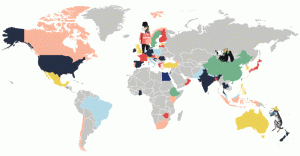Southern Cultures1 is a peer-reviewed quarterly2 of the history and cultures of the U.S. South,3 published by UNC Press for the Center for the Study of the American South,4 with readers in the region and beyond.5
1. Although it sounds straightforward, the journal’s name was a big point of contention for our founding editors, sociologist John Shelton Reed and historian Harry Watson, before the journal launched in 1993.
As Reed recalls: “I’d been assuming that the journal would be called Southern Culture, like the [recently released Encyclopedia of Southern Culture]. I believed, and still do, that there is such a thing, albeit with racial, social-class, and subregional variations. But Duke [University Press] insisted, and Watson agreed, that it should be called Southern Cultures (plural). I thought this was a chickenshit concession to fashionable multiculturalism, and said so. But I was outvoted, and conceded with an ill grace. Some of the articles we’ve published over the years show that there’s a lot that is southern and cultural I wouldn’t want to claim for southern culture, so I’m happy that I didn’t prevail.” We’re happy, too (no offense, John). Since our founding, we’ve worked to present a multiplicity of voices and experiences—from artists to activists, from Natives to newcomers—and we hope the journal’s name reflects just that.
2. In many ways we are a tried-and-true academic quarterly.
We are peer-reviewed, we publish original scholarship, and we use citations (even here in this very description). But we are not your typical journal—we eschew jargon and insider-speak, and in addition to scholarly articles, we print photo essays, original artwork, poetry, fiction, interviews, and creative nonfiction.
3. We’re no cartographers. You won’t find us charting a map or penning a single definition of the South.
From Faulkner in Bulgaria to Lebanese in Mississippi, and from teaching Gone With the Wind in Vietnam to the international avant-garde at Black Mountain, we recognize that no border can contain our complex region.
4. You can find us, pens and coffees in hand, at the Center for the Study of the American South at the University of North Carolina at Chapel Hill.
Check our events calendar and join us for issue launches and other programs.
5. We’re proud to have readers around the corner and around the world.

